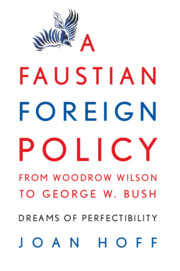Book contents
- Frontmatter
- Contents
- Introduction: Toward a Faustian Diplomacy
- 1 The United States Forms and Refines Its Diplomacy
- 2 The Faustian Impact of World War I on U.S. Diplomacy
- 3 The Faustian Aspects of Prosperity, Depression, and War
- 4 Faustian Aspects of U.S. Cold War Foreign Policy
- 5 Cold War Transformation of the American Presidency
- 6 The United States Adrift in the Post–Cold War World
- 7 Flaunting Faustian Foreign Policy
- Epilogue: The Legacy of George W. Bush
- Notes
- Bibliography
- Index
4 - Faustian Aspects of U.S. Cold War Foreign Policy
Published online by Cambridge University Press: 18 August 2009
- Frontmatter
- Contents
- Introduction: Toward a Faustian Diplomacy
- 1 The United States Forms and Refines Its Diplomacy
- 2 The Faustian Impact of World War I on U.S. Diplomacy
- 3 The Faustian Aspects of Prosperity, Depression, and War
- 4 Faustian Aspects of U.S. Cold War Foreign Policy
- 5 Cold War Transformation of the American Presidency
- 6 The United States Adrift in the Post–Cold War World
- 7 Flaunting Faustian Foreign Policy
- Epilogue: The Legacy of George W. Bush
- Notes
- Bibliography
- Index
Summary
When we Americans speak seriously about politics, we mean that our principles of freedom and equality and the rights based on them are rational and everywhere applicable. World War II was really an educational project undertaken to force those who did not accept these principles to do so.
Allan Bloom, The Closing of the American Mind (1987)During the various half-century commemorations of the Second World War in the 1990s, much was heard about the unity and triumph it represented rather than the viciousness with which the war was fought on both sides or the domestic problems that followed in its wake. This posthumous positive consensus about the outcome of the “last good war” confirmed that the twentieth century would be remembered as an “American Century,” as Henry Luce, the publisher of Time, Life, and Fortune, insisted in a little book he wrote in 1941. In this treatise Luce rhapsodized about an American century in which finance-capitalism and material growth would dominate because, as he said: “We are the inheritors of all the great principles of Western civilization – above all Justice, the love of Truth, and the ideal of Charity … [and] God has founded America as a global beacon of freedom.” These bombastic words seemed to reflect the preternatural American past while predicting the postwar mission and exceptional virtues of the United States.
- Type
- Chapter
- Information
- A Faustian Foreign Policy from Woodrow Wilson to George W. BushDreams of Perfectibility, pp. 92 - 111Publisher: Cambridge University PressPrint publication year: 2007



